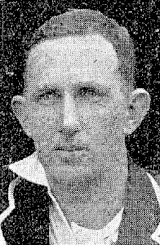Raoul Garrard
Derwent Raoul Garrard (6 October 1897 – 14 June 1977) was a New Zealand cricketer who played first-class cricket for Auckland from 1918 to 1942 and represented New Zealand in the days before New Zealand played Test cricket.
 | |||||||||||||||||||||||||||
| Personal information | |||||||||||||||||||||||||||
|---|---|---|---|---|---|---|---|---|---|---|---|---|---|---|---|---|---|---|---|---|---|---|---|---|---|---|---|
| Full name | Derwent Raoul Garrard | ||||||||||||||||||||||||||
| Born | 6 October 1897 Christchurch, New Zealand | ||||||||||||||||||||||||||
| Died | 14 June 1977 (aged 79) Auckland, New Zealand | ||||||||||||||||||||||||||
| Batting | Right-handed | ||||||||||||||||||||||||||
| Bowling | Right-arm leg-spin | ||||||||||||||||||||||||||
| Relations | Charles Garrard (father) Wilson Garrard (brother) William George Garrard (uncle) | ||||||||||||||||||||||||||
| Domestic team information | |||||||||||||||||||||||||||
| Years | Team | ||||||||||||||||||||||||||
| 1917-18 to 1941-42 | Auckland | ||||||||||||||||||||||||||
| Career statistics | |||||||||||||||||||||||||||
| |||||||||||||||||||||||||||
Source: Cricket Archive, 14 January 2015 | |||||||||||||||||||||||||||
Early life and career
Raoul Garrard was the elder son of Charles Garrard, a first-class cricketer and schoolteacher, and the brother of Wilson Garrard, who also played cricket for New Zealand. Raoul was a successful schoolboy cricketer in the Heathcote Williams Shield.[1]
A leg-spinner who put "plenty of turn on the ball"[2] and a useful lower-order batsman, Garrard made his first-class debut in 1917-18. In his third match, in 1918-19, he opened the bowling and took 6 for 143 and 5 for 84 in a high-scoring match against Wellington that Auckland won.[3]
In 1921-22 he was the leading bowler in the Plunket Shield, with 23 wickets in three matches at an average of 10.34.[4] He took 3 for 35 and 4 for 24 against Otago, 1 for 30 and 8 for 51 against Canterbury and 4 for 46 and 3 for 52 against Wellington. Auckland won all three matches, and the championship.[5]
He was selected to play for New Zealand in all three matches against MCC in 1922-23, but apart from top-scoring with 47 in the first innings of the first match he had little success with bat or ball.[6]
Later career
He played little first-class cricket for the next nine seasons, concentrating on his career as an accountant. He had a practice in Auckland, also acting as a liquidator.[7] He was honorary auditor to the Auckland Cricket Association.[8]
When he returned to Plunket Shield cricket in 1932-33 at the age of 35 he took 13 wickets at an average of 16.92 in three matches, including 5 for 69 and 5 for 83 (and 55 in the second innings) in the match against Wellington.[9] But in the same match the 18-year-old Wellington leg-spinner Doug Freeman took 4 for 85 and 5 for 102, and when the Test team to play England was announced shortly afterwards, Freeman was preferred.[10]
Garrard had another good season in 1933-34, taking 14 wickets in the Plunket Shield at 22.14 and making 154 runs at 51.33, including his highest score of 67 not out against Otago. Auckland won the Shield.[11] He played a few more matches before retiring.
References
- Auckland Star, 15 February 1919, p. 18.
- Free Lance (Wellington), 6 March 1919, p. 10.
- "Wellington v Auckland 1918-19". CricketArchive. Retrieved 4 February 2015.
- "Plunket Shield bowling averages 1921-22". CricketArchive. Retrieved 4 February 2015.
- "Plunket Shield 1921-22". CricketArchive. Retrieved 4 February 2015.
- Don Neely & Richard Payne, Men in White: The History of New Zealand International Cricket, 1894–1985, Moa, Auckland, 1986, pp. 61-64.
- Sydney Morning Herald, 27 June 1933, p. 2.
- Auckland Star, 27 September 1935, p. 13.
- "Auckland v Wellington 1932-33". CricketArchive. Retrieved 16 April 2015.
- Wisden 1995, p. 1384.
- "Plunket Shield 1933-34". CricketArchive. Retrieved 16 April 2015.
External links
- Raoul Garrard at CricketArchive
- Raoul Garrard at Cricinfo